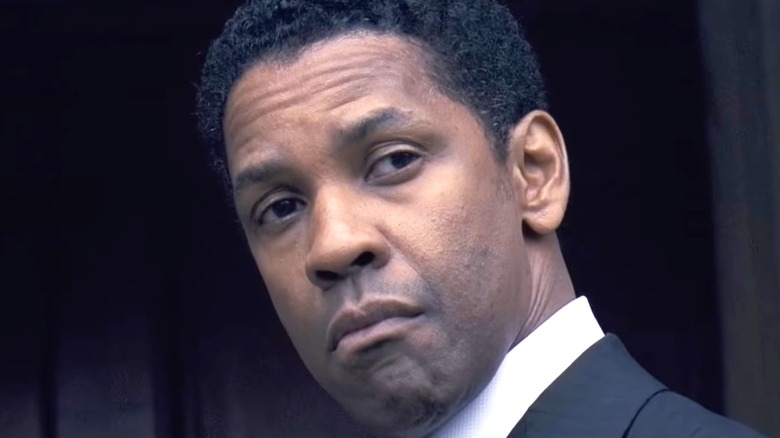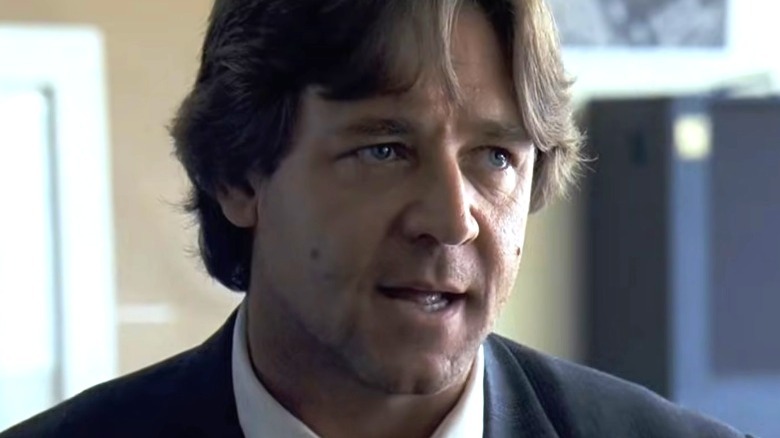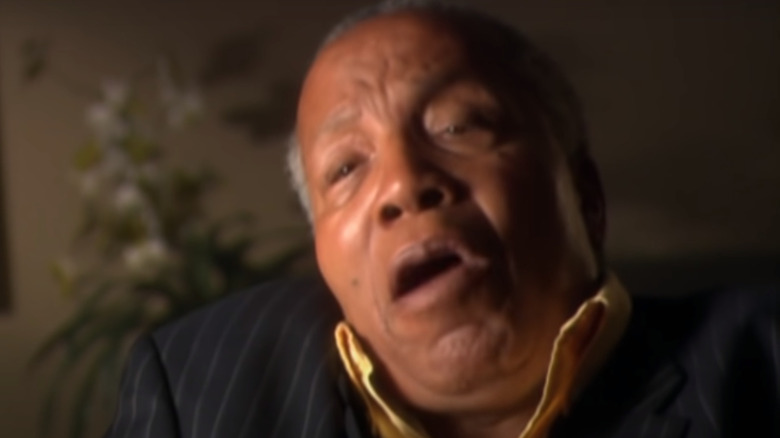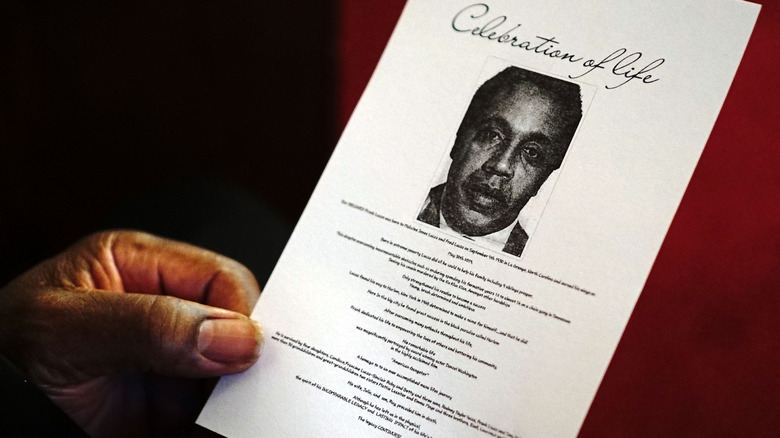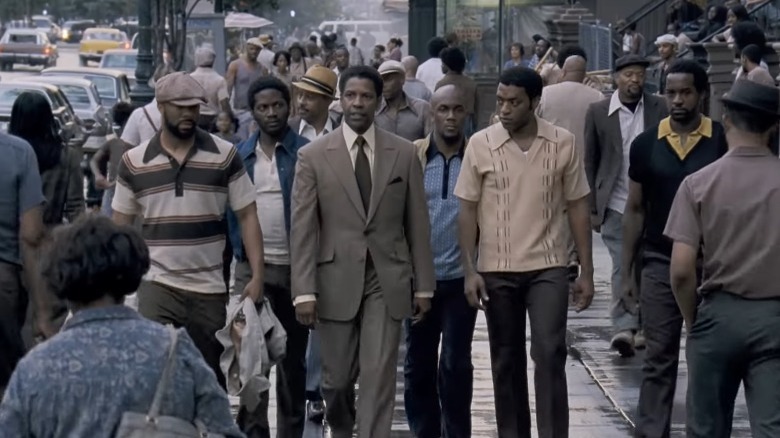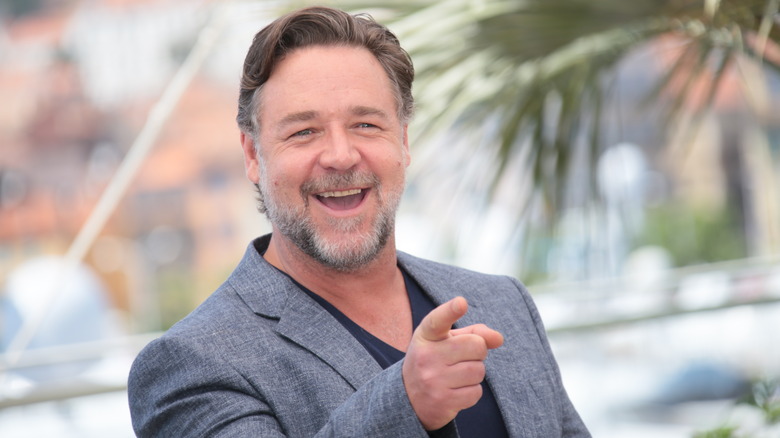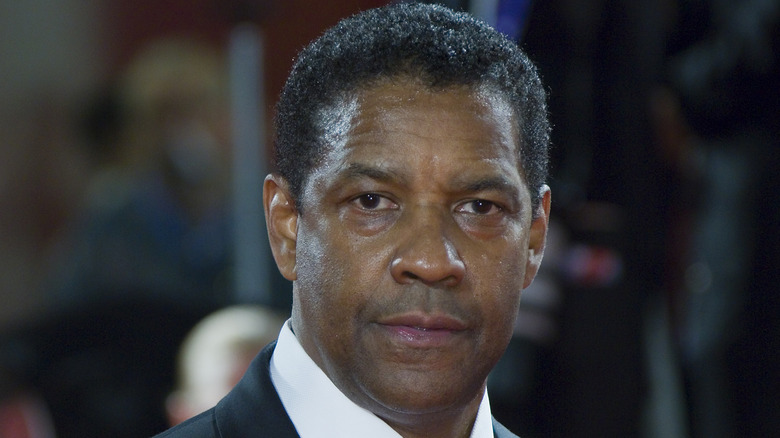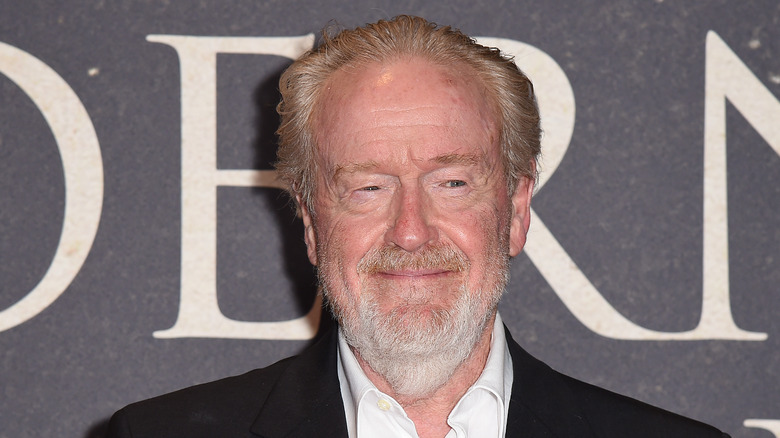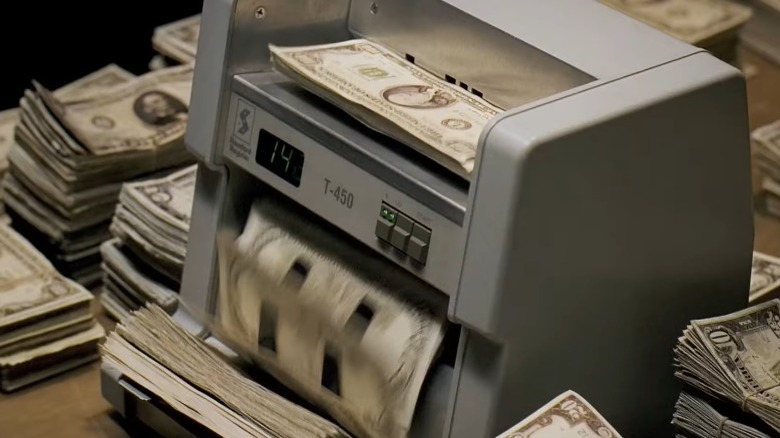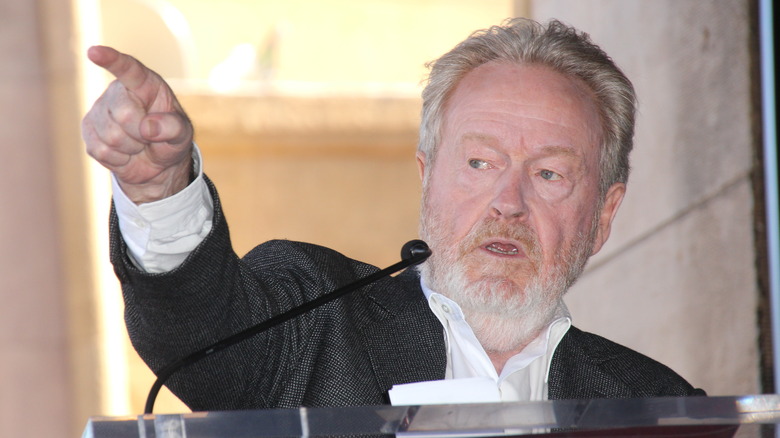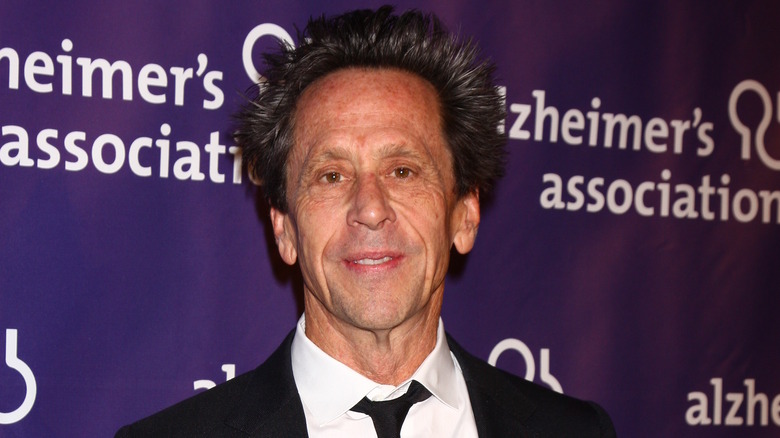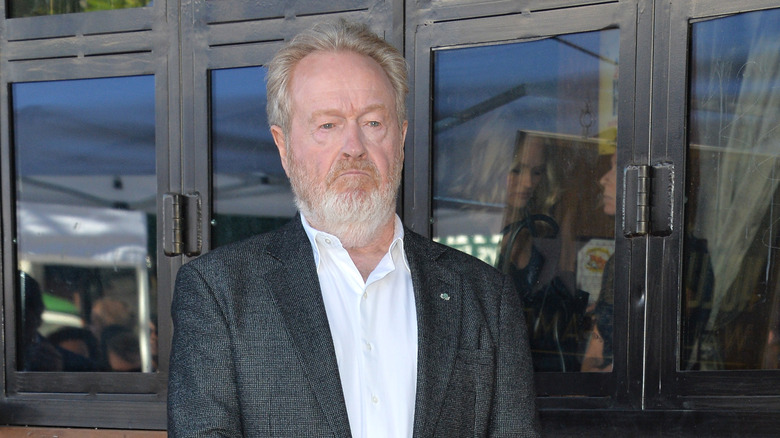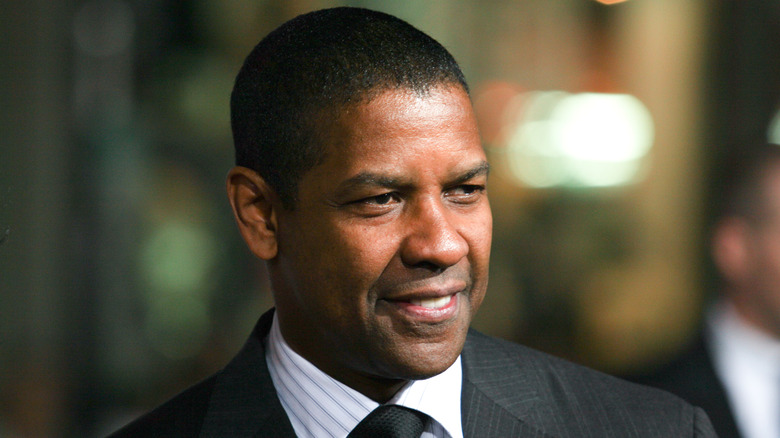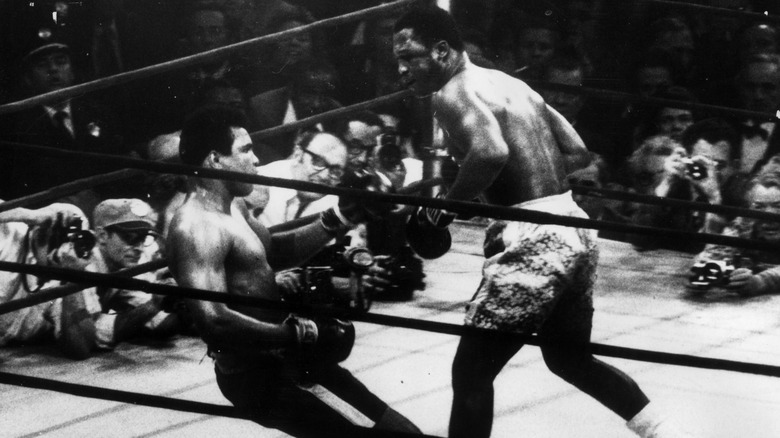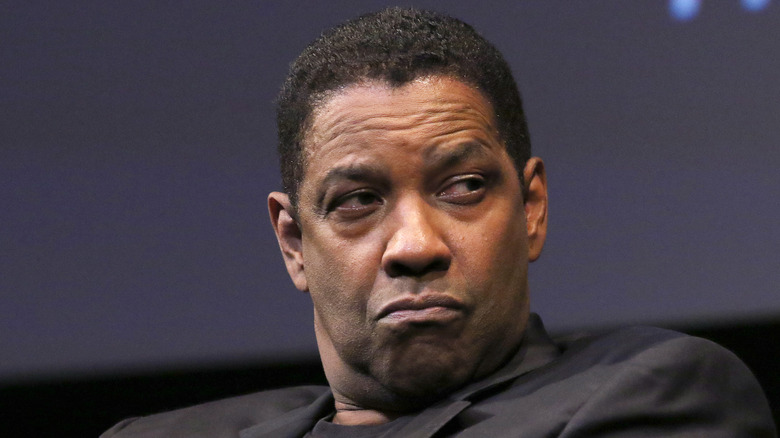The Untold Truth Of American Gangster
"American Gangster" chronicles the rise and eventual fall of Harlem kingpin Frank Lucas, as played by Denzel Washington in one of his most prominent roles of the 2000s. The film depicts Lucas making millions dealing heroin on the streets of New York by establishing his own supply chain in Vietnam and importing the drugs inside the body bags of soldiers killed during the Vietnam War. While the film tracks the growth of the Lucas criminal empire, it also follows Richie Roberts, the vice cop attempting to take Lucas and his organization down. Roberts — played by Russell Crowe in his third collaboration with director Ridley Scott, per Entertainment Weekly — receives open hostility from his fellow police officers for refusing to participate in the widespread corruption across the police department.
Released in 2007, "American Gangster" brought in nearly $270 million at the box office on a $100 million budget, per Box Office Mojo, and earned two Oscar nominations, via IMDb. The film enjoyed a warm critical response, such as from critic Paul Byrnes in The Sydney Morning Herald, who called it "the most intelligent gangster movie in years." While it is true that "American Gangster" covers some familiar territory explored in similar gangster films, there is enough to set it apart and make it shine as one of the decade's highlights in the genre. Esquire even went so far as to rank "American Gangster" amongst the best gangster films ever made. Here is the untold truth of "American Gangster."
The film is based on a New York Magazine article
"American Gangster" is a mostly true story and closely follows the lives of several real figures, focusing on Frank Lucas and vice cop Richie Roberts. Before becoming a film, the story of Frank Lucas and his criminal enterprise was first told by Mark Jacobson in a New York Magazine article titled "The Return of Superfly." This article would wind up serving as the basis for the "American Gangster" screenplay written by Steven Zaillian.
The real Frank Lucas grew up in a rural town in North Carolina before making his way to New York City. Lucas dubbed his organization the Country Boys and refused to allow major players besides his family members and other connections from his North Carolina hometown. Lucas wasn't willing to put his business in the hands of "city boys," as the control and trust he had in his relatives were two of the qualities he valued most in his associates. The name of Lucas's heroin in the film, Blue Magic, was the actual brand name Lucas dealt under. He claimed that his heroin sold better than the rest because "with Blue Magic, you could get 10% purity," while other brands topped out around 5%.
The real Frank Lucas and Richie Roberts were involved behind the scenes
While The New York Magazine article "The Return of Superfly" made for a good jumping-off point when writing the "American Gangster" screenplay, the filmmakers decided more research was needed. Since the real Frank Lucas had long since returned from prison to a private home, he and Richie Roberts were able to be involved in the film, as seen in a video about the making of "American Gangster" available on YouTube. This meant that writer Steven Zaillian and director Ridley Scott had direct access to the real people the film was based on and could speak with them to ensure its authenticity.
The stars of "American Gangster" were also able to speak with Frank Lucas and Richie Roberts. When portraying a real person in a film or television show, actors don't always have the luxury of meeting the actual person. As such, Denzel Washington and Russell Crowe jumped at the chance to speak with the individuals they would be playing on camera. As seen in the making-of clip on YouTube, Crowe got to better understand the morality and private life of the character he played by speaking to Richie Roberts. Likewise, Washington gained a deeper understanding of his character's way of thinking, charisma, and mannerisms by speaking at length with Frank Lucas.
Frank Lucas passed away in 2019
The real Frank Lucas passed away in May of 2019 of natural causes, per The Guardian. Lucas' health had been deteriorating for some time and he died at 88 years old. When speaking to the Associated Press in 2007, Lucas said that he regretted being involved in the deaths of heroin users. Lucas stated, "I did some terrible things. I'm awfully sorry that I did them. I really am."
As depicted in "American Gangster," Frank Lucas is eventually caught and sentenced to a lengthy prison term. However, after providing information that helped lead to the conviction of other criminals, Lucas' sentence was reduced. Rather than serve the decades in jail that he was sentenced to, Lucas only spent about five years in prison, as reported in The Guardian. This short stint wasn't the only time Lucas spent incarcerated, as he was arrested for drug dealing for a second time and wound up serving another seven years in prison before being released in 1991. Following that period of jail time, Lucas had one last brush with the law when he pleaded guilty to attempting to cash a $17,000 federal disability benefit check twice, per the Associated Press. He was sentenced to five years probation.
The film was shot across 180 real locations in New York
While not every shooting location used in "American Gangster" is publicly archived, many are. The exact figure isn't known, but somewhere in the neighborhood of 180 real locations across New York were used for the film. The production shot in all five boroughs and even in a few ancillary locations around New York state, as cataloged by Movie-Locations.com. Since the film takes place in the late '60s and '70s, careful location scouting, purposeful production design, and a coherent art direction were employed to avoid anachronisms.
Despite the care put into the production of "American Gangster," New Yorkers were able to spot some locations that don't quite line up with reality and even point out a couple of outright errors. Portions of "American Gangster" are set in New Jersey, where Richie Roberts lived, but these scenes were also shot in New York, as evidenced by Brooklyn's Williamsburg bridge visible in the background. In addition, the drug den interior scenes were filmed on Governors Island, which is located in New York Harbor, per Movie-Locations.com. However, a noteworthy Harlem location used in "American Gangster" was the Old Lenox building, which Denzel Washington had previously acted in front of in Spike Lee's "Malcolm X."
Denzel Washington and Russell Crowe disliked their first collaboration
Denzel Washington and Russell Crowe were both massive movie stars when they made "American Gangster," but only one of them was when they first collaborated. By the time he starred in the 1995 film "Virtuosity," Denzel Washington had already won his first Oscar for best actor in a supporting role in "Glory," per IMDb. Russell Crowe, however, was still on his way up. He had already appeared in a couple of notable films, such as the Australian movie "Romper Stomper" and the Sam Raimi western "The Quick and the Dead," but had yet to reach superstar status before he appeared opposite Washington in "Virtuosity."
Neither Denzel Washington nor Russell Crowe looks back fondly on "Virtuosity." In an interview featuring both actors on AALBC, Russell Crowe sarcastically called "Virtuosity" a "wonderful movie" before going on to say, "That was just a momentary lapse, wasn't it? We were both young then, young and innocent." Washington replied, "Not after that movie. We were old and tired." Between making "Virtuosity" and "American Gangster," Russell Crowe gave several critically lauded performances in films such as "L.A. Confidential," "A Beautiful Mind," "The Insider," "Cinderella Man," and the movie that earned him the best actor in a leading role Oscar, "Gladiator," via IMDb. Also in between their two collaborations, Denzel Washington earned his second Oscar, this time for best actor in a leading role for his performance in "Training Day."
Denzel Washington directed another movie at the same time
Around the same time that he was starring in "American Gangster," Denzel Washington found himself in the director's chair for the second time while making "The Great Debaters," which he also starred in. Both films were released in 2007, and Washington promoted both projects during the same press interviews, as seen in an interview with Get Frank. Similar to "American Gangster," "The Great Debaters" is another period piece telling a true story. Set in 1935, "The Great Debaters" tells the true story of the college debate team established by professor Melvin B. Tolson. The film was nominated for the best motion picture Golden Globe and won the best picture award from the African-American Film Critics Association, per IMDb.
Denzel Washington's first film as a director was the 2002 bio-drama "Antwone Fisher." Washington's next movie as a director following "The Great Debaters" arrived nearly a decade later with the film adaptation of the stage play "Fences." Washington and Viola Davis starred in a previous Broadway production of the play, and both were nominated for an Oscar for their work in the film, with Davis going on to win. August Wilson, the writer of the original play, received a posthumous Oscar nomination for his writing, and the overall film was honored with a nomination for best motion picture of the year, via IMDb.
Ridley Scott had a hard time figuring out what made Frank Lucas tick
Ridley Scott found the story of Frank Lucas and the vice cop committed to catching him to be a compelling dual-narrative, but when it came down to understanding the main character, he had a little bit of trouble. The Frank Lucas on the screenplay page made sense, but in speaking to the real Frank Lucas in person, Ridley Scott found it difficult to pinpoint what made the ex-gangster tick. In the behind-the-scenes featurette included on the "American Gangster" DVD and available on YouTube, Scott elucidates his difficulty in getting a feel for the real Frank Lucas.
"Would you call that charming? He's charming?" Ridley Scott wondered aloud about Frank's lack of fear or worry about flying to Saigon in the middle of an armed conflict. "Some people might put the word on it of a sociopath," he would go on to say, "but there's a definitely a coolness that makes a man like that tick." Even though he did many terrible things, including killing an unknown number of people, many describe Frank Lucas as charming and friendly. Even the man who took down his criminal empire, Richie Roberts, became friends with Lucas after he started to act as an informant. Roberts even became the godfather of Lucas's son Ray, per NJ.com.
The real Lucas crime organization was bringing in millions every day
At the height of his time as the kingpin of Harlem, Frank Lucas brought in more money than he knew what to do with. The real-life Frank Lucas estimates that he and his Country Boys were bringing in between $1 million from heroin sales every single day, as he described in a making-of feature for "American Gangster" available on YouTube. Adjusted for inflation, that would be about $6 million per day at the height of his drug-dealing efforts.
When the DEA raided Frank Lucas' home, they seized an estimated $500,000 to $600,000 in loose cash. Lucas also had $52 million held in a private bank account in the Cayman Islands. In addition to hard money, he also had several assets valued at millions of dollars. Lucas owned property spread all across the country, with buildings on both the East Coast and the West Coast, in addition to commercial office spaces in between. There was also a stockpile of raw heroin discovered at the time of his arrest that was valued at approximately $300 million, according to Celebrity Net Worth.
Scott spent a lot of time in Harlem in the '60s and '70s
Given that Ridley Scott was born in England in the 1930s, it would be understandable if it required a great deal of research and a team of experts to build an authentic recreation of late '60s and '70s Harlem. However, Ridley Scott had a personal connection to New York City that surprised many people working on the film. "I got to know Harlem well," Scott said in an interview with Showtimes. Much of the early stage of Ridley Scott's career was spent working as a commercial director. This work saw him traveling regularly, and one place he frequented in his line of work happened to be New York City starting in the mid-1960s.
"I got a lot of New York at that time. A lot of good and bad behavior. A lot of exciting times," Scott said while reflecting on his experiences in New York. "I met a lot of these people," he said of the population of Harlem depicted in the film. He also experienced "all the seedy sides of Manhattan, which of course were always exciting."
Universal Pictures almost canceled American Gangster
Producer Brian Grazer was one of the biggest champions of "American Gangster," and the film might not have happened without his stewardship, as revealed during an interview on "The Charlie Rose Show." He found himself compelled by the New York Magazine article about Frank Lucas, "The Return of Superfly," and brought Steven Zaillian on board to write the screenplay. He had approached Ridley Scott to direct the film years earlier, and while Scott liked the material, his schedule didn't allow him to commit to the project.
The film eventually found a director in Antoine Fuqua. "Everything was all set and ready to go," Grazer said of "American Gangster" during the interview on "The Charlie Rose Show." However, there was trouble in store for the film. "Universal decided that they weren't going to make it," Grazer revealed. Since a good amount of time had passed, Grazer circled back around to Ridley Scott, who now had an opening in his schedule and was interested in making "American Gangster." Getting Scott on board the production directly led to Denzel Washington and Russell Crowe signing onto the film. Now, with enough star power onboard, Grazer was able to get the production moving again with Universal Pictures.
Ridley Scott was worried about the big scene between Washington and Crowe
With two superstar Oscar winners in the lead roles, it might sound surprising that Ridley Scott was worried about the big scene between his primary characters, Frank Lucas and Richie Roberts. However, this was no ordinary situation, as their climactic meeting was essentially nothing more than a nine-minute conversation. "It doesn't matter how great the actors are talking across a table, you don't want a nine-minute scene," Ridley Scott told BBC while discussing the challenges of filming their confrontation. Most movie scenes aren't nine minutes long, and those that are typically showcase more than just dialogue between two stationary characters.
Even though Denzel Washington and Russell Crowe star together in the film, they rarely appear onscreen simultaneously. "They don't come together until about... maybe 12 minutes from the end," Ridley Scott told the BBC in an interview. He continued, "That was a scene I was always worried about." Luckily, those concerns didn't lead to any real problems, and Scott wound up happy with the results. He even went so far as to state, "I actually think it turned out to be one of the best scenes in the movie."
Denzel Washington grew up around the film's setting
Denzel Washington had a personal connection to the story of "American Gangster" because he grew up in and around Harlem, as he mentions in a making-of featurette about "American Gangster" available on YouTube. Like Ridley Scott, who had spent a great deal of time in Harlem as a commercial director, Denzel Washington knew the film's setting exceedingly well. Not only did Washington know the general area, but he could also remember walking as a child down the specific streets where Frank Lucas sold his drugs.
Washington said that he was too young to know exactly what was going on during that time, but he remembered wondering why they were always so packed with people. In that behind-the-scenes featurette for "American Gangster," Washington also explained that he could never have guessed that he would wind up meeting the man, Frank Lucas, who was responsible for all that activity 35 years later when making "American Gangster."
An ice hockey arena was used for the boxing match
One of the largest sequences in the film is the boxing match between Joe Frazier and Muhammad Ali. The scene is a pivotal moment in Frank Lucas' character arc and the overall narrative of "American Gangster." As depicted in the film, Frank Lucas operates as the kingpin of Harlem without anyone knowing who he is for an extended period of time, thanks to his knack for subtlety and secrecy. However, Lucas' style becomes more noticeable as he acquires more wealth. His decision to wear a matching chinchilla coat and hat combo valued at $125,000 to the boxing match is what first puts him on the radar of the law enforcement officers who eventually take him down.
The setting for this pivotal scene was the real-life match between Frazier and Ali in Madison Square Garden. The film, however, used an alternative shooting location. Ridley Scott's reason for why the site was changed was rather simple. "I didn't want to pay the fee at Madison Square Garden, which is insane," he told an interviewer with Showtimes. Instead, he used a nearby ice hockey arena, which the production team converted into a boxing ring for the shoot.
Denzel Washington almost turned down the part
It is hard to imagine anyone else in the role of Frank Lucas other than Denzel Washington, especially considering that "American Gangster" is the actor's highest-grossing film. However, Washington almost turned down the part, and his relationship with "American Gangster" changed a few times during development. "Early on, I actually wasn't that interested in doing the film," he told Charlie Rose during an interview available on YouTube, explaining that the idea of glorifying a drug-dealing gangster made him initially wary.
When Antoine Fuqua became attached to direct, Denzel told him, "I'll do it with you." Fuqua and Washington previously collaborated on "Training Day," which netted Washington his second Oscar win. When the project began falling apart as Universal Pictures lost interest in the film and Antoine Fuqua stepped away, Washington's interest in the project waned as well. When producer Brian Grazer brought in Ridley Scott to replace Fuqua, Denzel's enthusiasm for the film was renewed. Washington had a long history of collaborating with Ridley Scott's brother, director Tony Scott, and "When Ridley [Scott] came aboard ... everything changed," he remembered.
